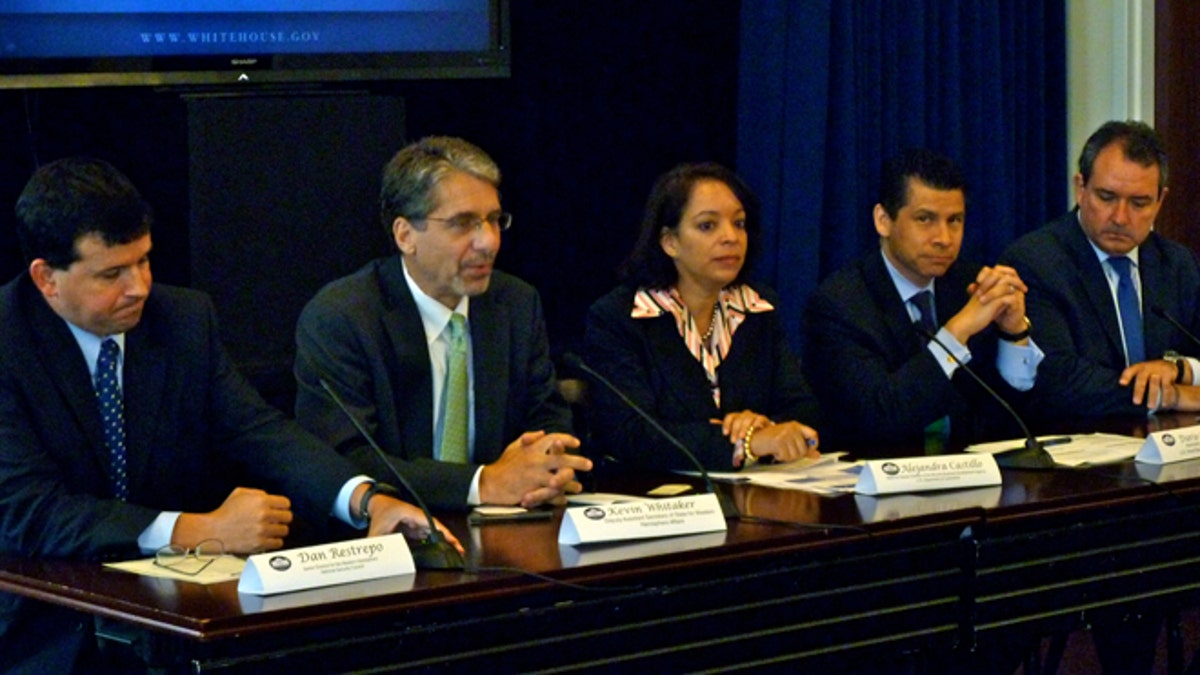
Trade and Small Business Panel with Dan Restrepo, Kevin Whitaker, Alejandra Castillo, Dario Gomez, and Gustavo Arnavat.
Throughout the world, 20 de julio or Colombian Independence from Spain is celebrated by dancing to cumbia and vallenato, toasting with our moonshine--aguardiente, as well as savoring delicacies like beef empanadas or patties, patacón pisao or fried plaintains, and arepas--corn cakes. That’s what I remember, having marked that day, which falls 16 days after American Independence Day.
This year, however, was different.
Along with several dozen Colombian-American business and community leaders, I spent my 20 de julio at the White House, attending a special briefing.
The invitation has to be placed within the context of the Obama Administration’s aggressive Hispanic outreach, turbo-charged as the November election draws nearer. At 972,000, or barely 2 percent of the Latino population, Colombian-Americans are dwarfed in numbers by the nearly 33 million strong Mexican-American community, according to the non-partisan think tank the Pew Hispanic Center. But Colombian-Americans are concentrated in Florida, perhaps this election’s most coveted battleground state with 29 electoral votes at stake.
Officials briefed the audience on the President’s policies--they argued that initiatives like the “Race to the Top” are helping reverse the trend of low education attainment in the Latino community. They maintained the controversial health care law recently upheld by the Supreme Court will help more Latinos--the group with the highest number of uninsured--gain access to coverage.
They defended the “tweaks” to immigration policies, such as delaying the deportations of DREAMers and non-violent undocumented immigrants, although the latter group is significantly backlogged since the program was announced in the Fall, according to a New York Times report.
Perhaps the Administration’s hardest sell was on the trade and economic front, which makes sense since the weak economic recovery, slow job creation, and the Latino unemployment rate that has trended two points above the national average is a weakness for President Obama. U.S. Executive Director to the Inter-American Bank Gustavo Arnavat quoted projections that the U.S.-Colombia free trade agreement will add $2.5 billion to the gross domestic product (GDP) and grow U.S. goods by $1.1 billion dollars a year, creating thousands of U.S. jobs.
Officials noted that the U.S.-Colombia free trade agreement, which experienced a delay in being ratified because of concerns of abuse of workers in Colombia, has only been in effect two months, with its full economic effects felt over time after its “infrastructure,” including the legal framework has been established that will allow businesses in both countries to trade, said Alejandra Castillo, the National Deputy Director for the Minority Business Development Agency at the Department of Commerce.
Guests raised questions and recommendations to improve the way some policies are being implemented in their communities such as support of English as a Second Language (ESL) programs or how to motivate undocumented immigrant high school drop outs by delaying deportation proceedings if they return to high school and enroll in college.
One businessman, Alberto Peisach, who owns a packaging and container business, expressed to Fox News Latino frustration with the high costs that burden small business, including the health care law, despite credits the Administration has promoted.
Often times, the Latino community feels “invisible” or even disrespected by the actions or inactions of political parties, candidates, and campaigns.
This Colombian-American briefing was a way to make the Obama Administration more hospitable.
But there still are independent or undecided voters like Peisach who the President needs to convince to help him stay “four more years.”












































